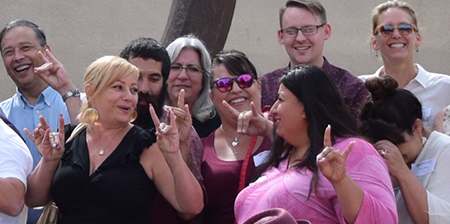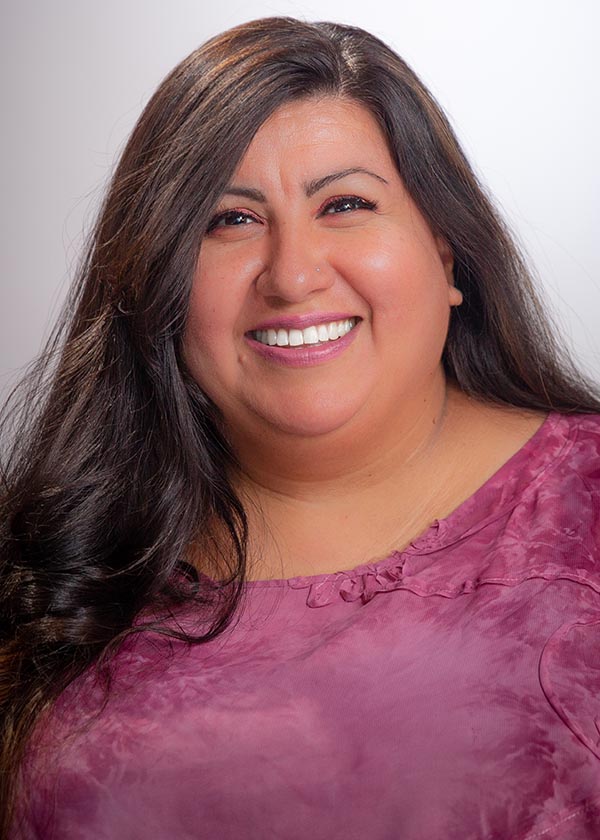Preparing for Disaster: UNM Hospital Participates in Region-Wide Emergency Training

Trusted Connections
UNM’s Venice Ceballos Brings Community Health Workers Into the Health Care Mix
Twenty-one years ago, Venice Ceballos took a clerical job in a New Mexico Department of Health office in Bernalillo, N.M., taking over from someone who’d worked there for 30 years.
“I started off as a clerk, but I quickly learned on Day 1 that everyone came to that office for advice,” she says. People sought information about domestic violence resources, family planning services, immunization records and counseling resources – pretty much everything under the sun.
Ceballos says that eye-opening experience set her on a path that has led to her current role as operations director for the Community Health Workers Initiative in The University of New Mexico Office for Community Health.
“In a sense I was already doing the work of a community health worker without even knowing it,” she says, reflecting on her long-ago experience in Bernalillo. “It was fun, and it was nice to be helping people.”
Community health workers (CHWs) play an increasingly important role in health care. As frontline public health workers, they facilitate access to services by serving as a trusted liaison between the communities they serve and health and social support systems.
CHWs often fill in the gaps in the health care system, particularly in rural and underserved areas, Ceballos says. They conduct Pap smears in India, where “you have village workers delivering buprenorphine in rural villages,” she says. “In Nicaragua CHWs carry medicine. They go to door and administer medicine to babies that have chronic diarrhea and wind up saving their lives.”
Ceballos oversees a staff of 35 in the initiative, which partners with 22 community organizations to help them train their own CHWs. New grant funding is expected to increase the staff to 59, with 60 additional organizations coming onboard by July 1.
“I really love teaching and working with adults, like CHWs,” she says. “These are people who live in the communities that they serve. They’re really dedicated individuals that are going to do this kind of work, whether they’re paid or not.”
Ceballos, who was born in El Paso to parents who had immigrated from Mexico, grew up in Albuquerque’s North Valley. “I wanted to be a nurse,” she says. “I volunteered at UNM Hospital. It wasn’t my thing.”

This is the work I live and breathe. I love working with community health workers
She took the DOH job at her brother’s recommendation. After five years in her clerical role, the department hired her to help build a new CHW program, working with families and the elderly. She grew her skillset in that role. “They did a lot of reflective supervision,” she says. “They offered a lot of coaching regarding how I should work within families, but also building me to be a leader.”
In 2011, her next move took her to Project ECHO, UNM’s signature tele-mentoring program, where she started off as a trainer and was promoted four times, ending up as director of its CHW operations. On her watch, the program helped build capacity throughout the U.S and in India.
Since joining the Office for Community Health in March 2019, Ceballos “has built her Community Health Workers Initiative into an extraordinary service to the community,” says Arthur Kaufman, MD, Vice Chancellor for Community Health. “Now she has city, county and state agencies asking her to apply for their grants to address everything from reducing health and social inequities, to housing the homeless to reducing recidivism among those released from detention, to reducing evictions, and on and on. It just keeps growing.”
Kaufman says her achievements are especially noteworthy because she lacks a college degree. “The higher you get up the more they want you to have your degree,” says Ceballos, who is currently at work on her bachelor’s degree. “The university has allowed me to use my community knowledge to justify in place of a degree.”
CHWs have played an especially important role in the COVID-19 pandemic, which disproportionately affected people of color, Ceballos says. “CHWs were going door to door, educating people about safe practices.”
Now, to promote higher vaccination rates, the Department of Health plans to hire CHWs to facilitate access to inoculations for underserved communities, in some cases bringing mobile vaccination units to their neighborhoods, she says.
Ceballos has also been active in efforts to promote greater adoption of the CHW model. She helped to develop a standardized curriculum for CHWs seeking certification through the Department of Health.
“This is the work I live and breathe,” Ceballos says. “I love working with community health workers.”